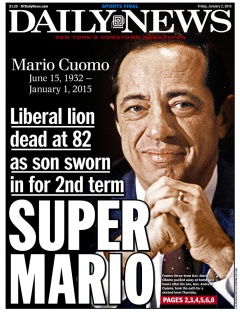Mario Cuomo
(politician) | ||||||||||||
|---|---|---|---|---|---|---|---|---|---|---|---|---|
 | ||||||||||||
| Born | Mario Matthew Cuomo 15 June 1932 Briarwood, Queens, New York, U.S. | |||||||||||
| Died | 1 January 2015 (Age 82) Manhattan, New York, U.S. | |||||||||||
| Alma mater | St. John's University | |||||||||||
| Religion | Roman Catholicism | |||||||||||
| Children | • Andrew • Maria • Margaret • Madeline • Chris | |||||||||||
| Spouse | Matilda Raffa | |||||||||||
| Member of | National Democratic Institute/Board and Staff | |||||||||||
| Party | Democratic | |||||||||||
New York Democratic party politician
| ||||||||||||
Mario Cuomo was an American Democratic Party politician who was the 52nd Governor of New York for three terms, from 1983 to 1995.[1]
Cuomo was defeated for a fourth term as New York Governor by George Pataki in the "Republican revolution" of 1994, and he subsequently retired from politics. He was the father of five, including Andrew Cuomo, the current Governor of New York, and journalist Chris Cuomo, currently at CNN.
He died of natural causes due to heart failure in Manhattan, New York City, on New Year's Day 2015.[2]
Sanctions against Apartheid
On 19 May 1985, Governor Cuomo announced the introduction of legislation requiring the divestiture, over the following five years, of billions of dollars in state funds from the apartheid state, including about $4.4 billion in employees' and teachers' pension funds which were invested in hundreds of American companies doing business in South Africa:
- "I have concluded that New York State should adopt a comprehensive and responsible strategy to demonstrate the abhorrence of our residents to the pernicious system of apartheid."[3]
Eighteen months later, the US Senate overrode Ronald Reagan's veto and introduced the Comprehensive Anti-Apartheid Act which banned all new investment by Americans in South African businesses, prohibited the importation of such products as steel and coal from South Africa and cancelled landing rights in the United States for South African airlines.[4]
"Hamlet on the Hudson"
Mario Cuomo was known for his liberal views and public speeches, particularly his keynote speech at the 1984 Democratic National Convention where he criticised Ronald Reagan's policies. The speech brought him to national attention, and he was widely considered a front-runner for the Democratic nomination for President in both 1988 and 1992 Democratic Party presidential primaries, but he declined to seek the nomination in both instances.
His legacy as a reluctant standard-bearer for the Democrats in presidential elections led to him being dubbed "Hamlet on the Hudson".[5][6]
Reluctant candidate
After Bill Clinton won the Democratic nomination for President in 1992, Mario Cuomo was proposed as a candidate for vice president but he refused to be considered and did not make Clinton's final shortlist.[7]
Cuomo was also spoken of as a candidate for nomination to the United States Supreme Court, but when President Clinton was considering nominees during his first term to replace the retiring Byron White, Cuomo stated he was not interested in the office.[8] George Stephanopoulos wrote in 1999 that Clinton came within 15 minutes of nominating Cuomo before the latter pre-emptively rejected the post.[9]
References
- ↑ Biography for Mario Cuomo at the Internet Movie Database
- ↑ Mario Cuomo, NNDB, Soylent Communications, 2013, Retrieved December 29, 2013.
- ↑ "Cuomo Proposes State Sell Stock In Concerns Tied To South Africa"
- ↑ "Senate, 78 to 21, Overrides Reagan’s Veto and Imposes Sanctions on South Africa"
- ↑ http://www.cbsnews.com/8301-505263_162-57501477/best-and-worst-convention-addresses-how-will-gov-chris-christie-measure-up/
- ↑ http://www.capitalnewyork.com/article/politics/2011/04/1812706/mario-effect-last-time-group-presidential-challengers-was-unimpress?page=all
- ↑ http://www.nytimes.com/1992/07/10/us/1992-campaign-democrats-clinton-selects-senator-gore-tennessee-running-mate.html
- ↑ Cuomo announces he is not seeking seat on high court, The New York Times, April 8, 1993, Sack, Kevin. Retrieved December 27, 2013.
- ↑ Book tells of 'courtship' to get Cuomo on high court, The New York Times, March 8, 1999, McFadden, R.D. Retrieved December 27, 2013.
Wikipedia is not affiliated with Wikispooks. Original page source here